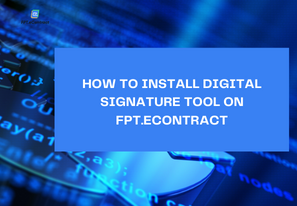Electronic contracts: Pros and cons
- 04/01/2023
- [post-views]
What is an Electronic Contract?
Is an agreement created and ‘signed’ electronically? Paperless Electronic Contracts. A specific example is a contract you compose on your computer to send to a business partner, who will then email back with an electronic signature indicating acceptance of the agreement.
Expression by electronic data message
Expression is the most prominent feature of electronic contracts. Unless otherwise discussed by the parties, the offer to enter into the contract and the acceptance of the conclusion of the contract shall be expressed through an electronic data message. In signing a contract, there are at least 3 parties involved.
In addition to the two ordinary parties such as a paper contract, which are the seller and the buyer, in an electronic contract there is also a third party that is closely linked to the electronic contract – that is, the parties providing the contract. network service application, and electronic signature certification authority.
The third party does not participate in the signing process, but only participates as a support organization to ensure the effectiveness and legality for the conclusion and performance of the electronic contract. The scope of application is somewhat limited. Article 1 of the Law on Electronic Transactions 2005 stipulates that electronic transactions can only be applied in a few specific fields: activities of State agencies; in the civil, business, commercial and other fields prescribed by law but not applicable to the issuance of certificates of land use rights, ownership of houses and other real estate, documents on inheritance, marriage certificate, divorce decision, birth certificate, death certificate, bill of exchange and other valuable papers.
Borderless The two parties to the contract do not need to be in direct contact because the electronic contract is set up in the form of a data message. That is, at any time and place, both parties can actively enter into a contract.
Intangibility, immateriality Electronic contracts are invisible, immaterial, that is, exist, are proven and stored by electronic data that cannot be perceived by touch, due to the electrical environment. death is a digitized environment.
Modernity and accuracy An electronic contract is signed using modern technical means, this is the modernity of the contract, and is the result of the development of science and technology in the past this session. From there, it also brings accuracy to the transaction. In the 4.0 era, in the future, electronic contracts will be a new trend to gradually replace traditional paper contracts.
First, the fact that this method does not need to use paper has helped businesses solve the problem of cost, time and resources from printing, transportation, to signing, storing and preserving. contract. In addition, all processes will be carried out in an electronic environment, so security and safety will be maximized.
Another advantage when converting to electronic contracts is that customers can perform digital signatures simultaneously, anytime, anywhere, on many devices without meeting or contacting directly. Not to mention the benefits of streamlining procedures, this method is also particularly suitable and effective in the context of the Covid-19 epidemic, ensuring that the signing can take place smoothly, without worrying about interruptions and delays. malfunction.
In electronic transactions, information security is always a top important factor that businesses are extremely concerned about. With standard operation, all data about the business as well as the transaction process is committed to maximum security.
On the other hand, this form also helps to limit the situation of impersonation and fraud that directly affects businesses. In short, when signing contracts electronically, businesses can receive the following practical benefits: Simultaneous digital signatures, anytime, anywhere Maximum data security, safety information Touchless, contactless process Easy management – safe storage Shorten time – reduce costs
- Depends on the web
– The key issue with e-contracts is that you need a computer system and a network connection to access the e-contract. This means that you cannot access the contract at a time when you cannot use your computer or electronic device.
- Not enough storage space
– Some companies have limited storage space on their servers making it impossible to save all documents. Possibly saved to third party storage, but may be privacy related in some cases. If the company uses a server that is not tightly protected, it will lead to security problems.
- Risk of system failure
– For some reason, the computer system or web server crashes can lead to the deletion of all data from that system, which means the loss of all documents related to the contract and even Even the contract is printed.
- Less Security
Electronic signatures have weak or no security, or are capable of providing tamper protection. So even electronic contracts are vulnerable and insecure.
- Reliance on proprietary third-party software
– Electronic signatures used in electronic contracts are based on proprietary software, which can be a concern for businesses that do not want to depend on other vendors to sign contracts because it can lead to to matters of confidentiality or secrecy.
- Reluctance to use electronic contracts
– Some people still prefer paper contracts. They may not be willing to accept the idea of an electronic contract. It is possible that there is no appropriate software on the system, or simply do not know how to use it.
For more information, please contact FPT Electronic Contract:
Phone: 1900.636.191
Email: fpt.econtract@fpt.com.vn
Website: econtract.fpt.com.vn/










